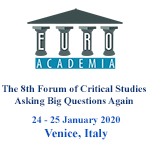Euroacademia Conferences
 Europe Inside-Out: Europe and Europeanness Exposed to Plural Observers (9th Edition) April 24 - 25, 2020
Europe Inside-Out: Europe and Europeanness Exposed to Plural Observers (9th Edition) April 24 - 25, 2020 Identities and Identifications: Politicized Uses of Collective Identities (9th Edition) June 12 - 13, 2020
Identities and Identifications: Politicized Uses of Collective Identities (9th Edition) June 12 - 13, 2020 8th Forum of Critical Studies: Asking Big Questions Again January 24 - 25, 2020
8th Forum of Critical Studies: Asking Big Questions Again January 24 - 25, 2020 Re-Inventing Eastern Europe (7th Edition) December 13 - 14, 2019
Re-Inventing Eastern Europe (7th Edition) December 13 - 14, 2019 The European Union and the Politicization of Europe (8th Edition) October 25 - 26, 2019
The European Union and the Politicization of Europe (8th Edition) October 25 - 26, 2019 Identities and Identifications: Politicized Uses of Collective Identities (8th Edition) June 28 - 29, 2019
Identities and Identifications: Politicized Uses of Collective Identities (8th Edition) June 28 - 29, 2019 The European Union and the Politicization of Europe (7th Edition) January 25 - 26, 2019
The European Union and the Politicization of Europe (7th Edition) January 25 - 26, 2019 7th Forum of Critical Studies: Asking Big Questions Again November 23 - 24, 2018
7th Forum of Critical Studies: Asking Big Questions Again November 23 - 24, 2018 Europe Inside-Out: Europe and Europeanness Exposed to Plural Observers (8th Edition) September 28 - 30, 2018
Europe Inside-Out: Europe and Europeanness Exposed to Plural Observers (8th Edition) September 28 - 30, 2018 Identities and Identifications: Politicized Uses of Collective Identities (7th Edition) June 14 - 15, 2018
Identities and Identifications: Politicized Uses of Collective Identities (7th Edition) June 14 - 15, 2018
‘Things Turn Against Us’: The Future as Present, as Project, and as Unpredictable
-
-

-
Presentation speakers
- Evy Varsamopoulou, Department of English Studies, University of Cyprus, Nicosia, Cyprus
Abstract:
This paper puts forward two theses on thinking the future: 1. the future is now, 2. the future is beyond our control. The first thesis will be defended on the basis of its greatest efficacy for responsible, transformative praxis and through neuroscientific work. The second thesis will be illustrated by reference to literature and philosophy. Specifically, through a reading of the satirical science-fiction novel, Cat’s Cradle (1963), by Kurt Vonnegut, and an early essay by Emmanuel Levinas, ‘Is Ontology Fundamental?’ (1951). Levinas traces the original causes of comedy to an intrinsic ‘awkwardness’ in all human gestures and argues that our responsibility does not end with our intentions. If mastery of reality is never complete or total, as Levinas says, then neither is mastery of the future. In Cat’s Cradle, significantly published at the start of the modern environmental movement (set in motion by Rachel Carson’s Silent Spring [1962]), Vonnegut had clearly grasped the comedic aspect of modern science aspiring to total knowledge and mastery of nature. The novel debunks the amorality of ‘pure research’ projects and indicts the irresponsible misuse of the applications of scientific discovery. Errors of judgment are fatally exacerbated by the awkwardness of physical comedy. The most well-meaning spiritual, ethical and political arrangements not only do not save humanity but inadvertently collude with the end of life on earth. The generic interplay of comedy and tragedy results in an absurd apocalypse.
-
Related Presentations

Identity and Urban Image between Developmentalism and Neoliberal Policies
- Horacio Torrent Schneider













